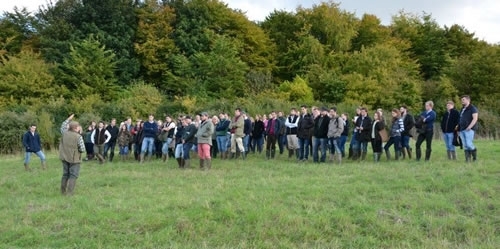This blog post originally appeared on Peter's 'Fresh from the Field' blog on 14th October 2015.
Over the last week I have been involved with training a good mixture of different people in, well for want of a better title, countryside management.

I joined up with work colleague Jim Egan at the GWCT Allerton Project farm at Loddington in Leicestershire, for a two day course training a dozen agronomists. As I write this, I thought “will everyone reading this know what an agronomist is? So, I looked it up in the Oxford dictionary – even though I used to work in days gone by as a fully trained agronomist!
It says that agronomy is “the science of cultivation of land, soil management, and crop production”. Sure, this is what a field agronomist advises farmers on – but I think that needs up-dating!! For instance, I would really like to see the words “water” and “environment” in there somewhere!
Modern agronomy
So much of a modern day agronomist’s life is concerned with minimising the impact of what they do on the environment, not only within the cropped field itself, but also on the wider landscape.
So the training course covered topics as diverse as the life cycles of the Skylark and Brown Hare, to the best ways to buffer water courses, through to the correct disposal of farm waste such as spray cans and controlling pests by encouraging beneficial insects that will do the job for them.
None of these topics sit that comfortably under the Oxford definition!
It may sound surprising to many folk, but I think that a top notch agronomist is key to delivering quality conservation on a farm. He or she can make such a difference to every aspect of the farm. After all, along with the farmer, they probably know the farm better than anyone as they constantly walk the fields throughout the year.
The Temple estate with Cirencester University
My next stop was the Temple estate near Marlborough, for the annual outing of Cirencester University students. Two coach loads (plus assorted cars!) bring students from a range of courses who hope to one day be in charge of a farm or estate themselves, or maybe working as land agents or as surveyors.
Indeed, one cheerful girl told me when I asked her what she thought she might do as a career, replied very quickly – "your job would be absolutely perfect". At my age, that can be really quite disconcerting!
The Marlborough Downs could not have looked more perfect on a bright, sunlight day, as my colleagues Mike Swan and Austin Weldon from the GWCT Advisory team helped me show the students around the estate. Once again we covered a wide range of topics around the running of a large commercial estate.
Sparsholt college lecture discussion
Then onto Sparsholt college in Hampshire to give a lecture to the “Ecology and conservation” students on the topic of “Landscape scale conservation”. I say “lecture” which sounds rather grand – more of a discussion really, as I like students to air their own opinions and ask lots of challenging questions.
This group, overseen by good friend and course leader Matthew Norris-Hill were a great mix of ages and skill sets, so it was a lively debate and I think (hope) that they got plenty from the two hours.
Educating students and professionals
Part of the GWCT’s charitable status is that we “educate” and I think that in general students and professionals alike, find our practical approach, largely based on our own research, refreshing. That is what they tell us anyway!!
It is always most rewarding when in years to come, you bump into an individual who is overseeing an estate or project, that you once lectured as a young faced student!
Sign up for the FREE weekly GWCT Newsletter
Get all of Peter's and the GWCT's latest blog updates sent straight to your inbox each Tuesday.
Sign up FREE to the Weekly GWCT Newsletter >
